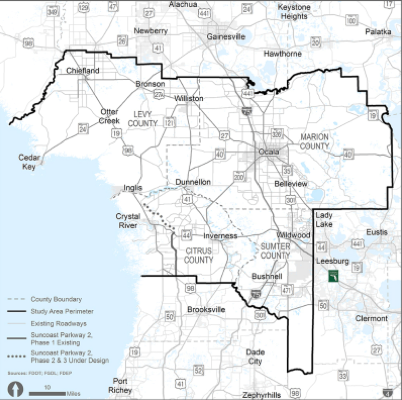Lazaro Aleman
news@greenepublishing.com
The Florida Department of Transportation (FDOT) announced recently that it was putting on hold the Northern Turnpike Extension Project as its Alternative Corridor Evaluation (ACE) Study had concluded with no viable routes proposed.
In its Thursday, Aug. 4, announcement, the department added that it would not be pursuing the project any further until all the options could be reassessed to address the concerns of the department and the affected communities.
The FDOT noted that, based on the feedback received from across the four-county study area, "significant concerns were identified with portions of all four initially proposed corridors." Consequently, said the FDOT press release, the agency was deeply committed "to thoroughly exploring all concerns received," so as to ensure that environmental worries were addressed and community characteristics were protected.
The agency stated that it would continue to refine and develop viable corridor concepts for the area and seek community input in the process.
For the near term, the FDOT announced, it would dedicate resources to prioritize improvements on the I-75 corridor.
The FDOT asserted that the foundation of every one of its projects aimed to balance the state's evolving transportation needs with the local and regional visions of the affected communities.
The FDOT announcement elicited an immediate response from the No Roads to Ruin Coalition, a group formed in opposition to the defunct 2019 Multi-use Corridors of Regional Economic Significance (M-CORES), which would have created a 330-mile toll road network from Collier to the Panhandle, and of which network, the Northern Turnpike Extension survived in altered form.
The M-CORES, one of whose three toll roads, the Suncoast Connector, originally would have reached into Jefferson County, was technically repealed by the Legislature in 2021 and replaced by the proposed Northern Turnpike Extension project. This had the potential to directly affect Madison County, where it was supposed to terminate, according to the last iterations of the plan.
"This is no doubt the best news that the No Roads to Ruin (NRTR) community has received since M-CORES reared its ugly head in 2019," stated a press release from the organization's steering committee.
Whatever the meaning of the "pause," the NRTR attributed the decision in great part to the mobilization of the voters of Citrus, Levy, Marion and Sumter Counties, whose vocal opposition led to the adoption of "No Build" resolutions by various of the local governments in the affected communities.
The FDOT decision, however, leaves a great many unanswered questions, according to the NRTR. These questions include, how the "pause" impacts the FDOT statutorily required status report to the governor and legislature at year's end; if the FDOT is required, or planning, to complete its project development and environment (PD&E) study; and how long until a final decision is made as to the project's fate?
Given that the project still maintains a website as a resource for updates, the NRTR is not optimistic that the project has truly been put to rest.
"This does not send a signal that the project is dead until the FDOT makes its position crystal clear," the NRTR release stated, maintaining its position that the extension is "an unneeded, unwanted, costly and politically driven boondoggle."
Another group to celebrate the FDOT's announcement was 1,000 Friends of Florida. The organization noted that had the corridor come to fruition, it would have cut through some of the finest agricultural lands, wildlife habitats and vulnerable springheads in the affected counties.
For more details on the project, visit www.floridashturnpike.com/NTE.

